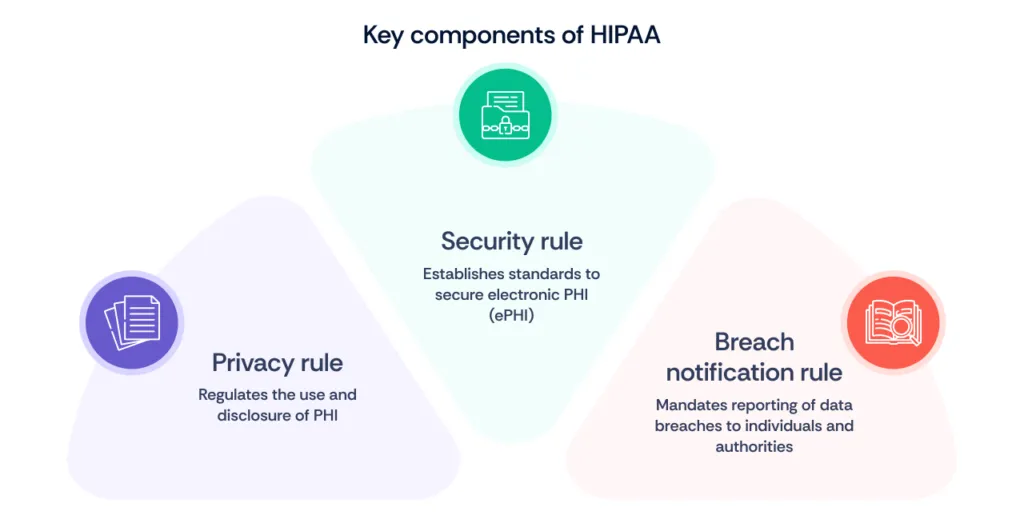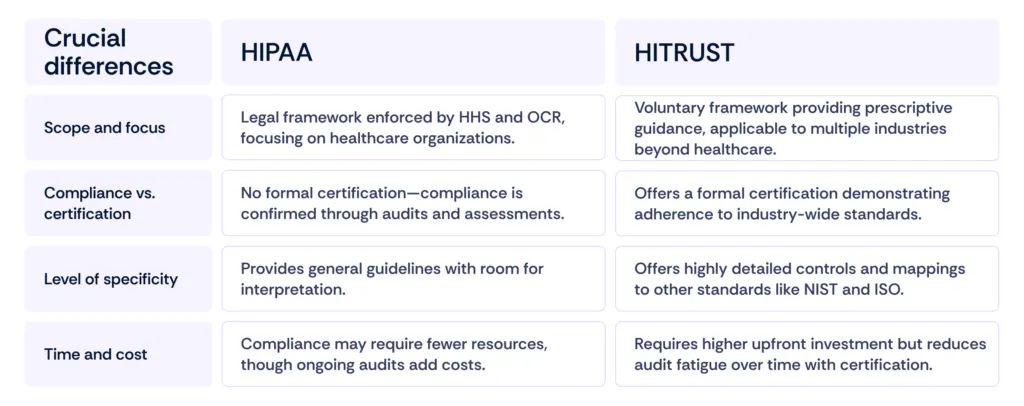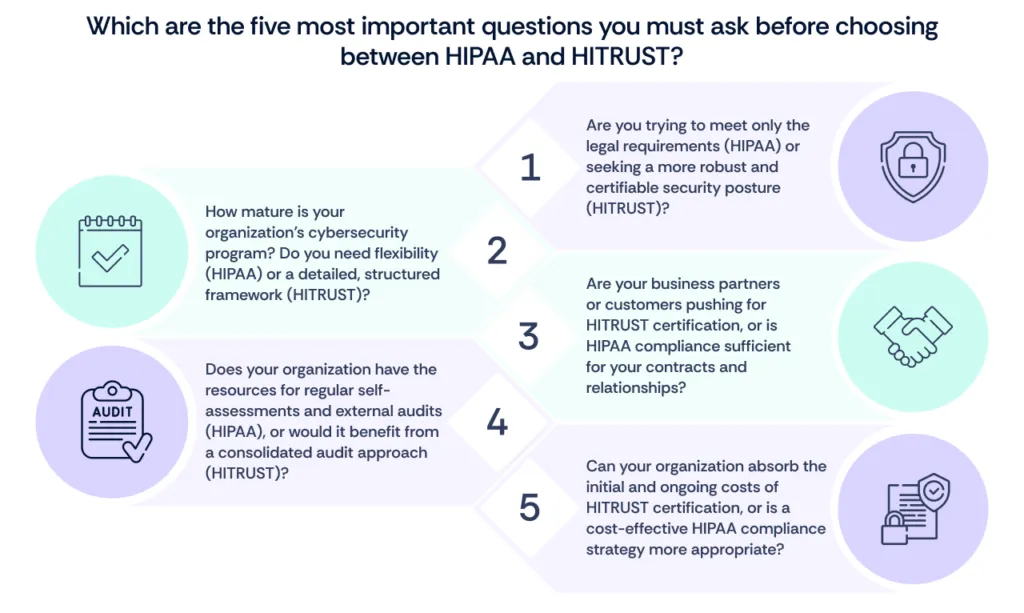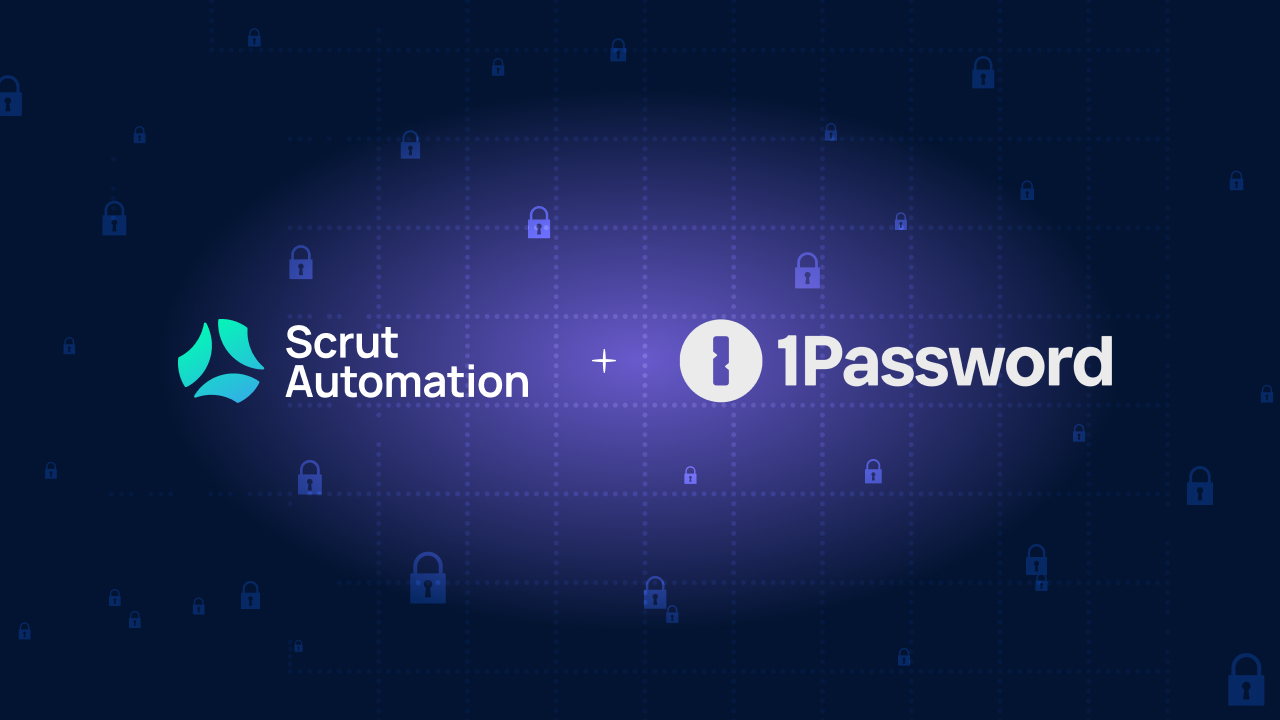Choose risk-first compliance that’s always on, built for you.
Go back to blogs
HIPAA vs HITRUST? Important similarities and differences
Last updated on
April 21, 2025
11
min. read
.webp)
1. Introduction
With the healthcare sector becoming a prime target for cyberattacks, compliance frameworks like HIPAA and HITRUST have become essential. Sensitive medical data, including patient records and operational systems, are frequent targets for ransomware and phishing campaigns. Ensuring data protection through robust frameworks is now a priority for healthcare organizations.
In 2023, healthcare data breaches reached record levels, with 725 reported incidents involving 133 million exposed records. In December alone, 74 breaches occurred, marking it as the second-highest month for incidents that year. Hacking and ransomware were the main culprits, responsible for over 83% of these cases, affecting providers, business associates, and health plans alike. This upward trend underscores the urgent need for stronger cybersecurity measures throughout the healthcare sector.
This article aims to help CEOs, founders, and decision-makers understand the key similarities and differences between HIPAA and HITRUST. The goal is to help organizations select the right strategy for their needs by clarifying how each framework addresses compliance and data security.
2. Understanding the basics: HIPAA and HITRUST
Aligning with the appropriate framework ensures regulatory compliance, builds trust with stakeholders, and serves as a cybersecurity safeguard. Given the complexity of healthcare operations, the right compliance strategy not only helps prevent hefty fines but also protects the organization from reputational damage.
Choosing between HIPAA’s legal requirements and HITRUST’s comprehensive security controls can mean the difference between meeting minimal standards and achieving a proactive, risk-mitigating stance.
2.1 What is HIPAA?
The Health Insurance Portability and Accountability Act (HIPAA), enacted in 1996, is a U.S. federal law designed to protect the privacy and security of sensitive patient data, known as Protected Health Information (PHI). It ensures that healthcare providers, insurers, and business associates manage patient data responsibly.

HIPAA aims to safeguard healthcare information while promoting trust and operational integrity within the healthcare sector.
Read also: Understanding HIPAA violations: Types, prevention, and best practices
2.2 What is HITRUST?
The HITRUST Common Security Framework (CSF) is a comprehensive framework that unifies around 50 security, privacy, and compliance standards, including HIPAA, NIST, and ISO. It was created to provide organizations with a scalable and efficient approach to managing data protection and regulatory compliance.

Read also: A guide to HIPAA for social media
3. Key similarities between HITRUST and HIPAA
We saw the difference between HITRUST vs HIPAA. Now, let’s look at the similarities. The similarities between HIPAA and HITRUST highlight their shared focus on robust cybersecurity and data protection in healthcare.
Read also: How to map HIPAA to ISO 27001?
4. Crucial difference between HIPAA and HITRUST
The following table shows the HIPAA vs HITRUST:

Read also: Which entities are covered under HIPAA?
5. Choosing between HITRUST vs HIPAA: Strategic considerations

When it comes to building trust and ensuring compliance within the healthcare industry, organizations face a strategic decision: aligning with HIPAA (Health Insurance Portability and Accountability Act) or pursuing HITRUST (Health Information Trust Alliance) certification.
Although both frameworks serve the common goal of protecting sensitive healthcare data, they differ in scope, application, and operational impact. Below are the strategic factors to consider when choosing between HIPAA vs HITRUST.
a. Regulatory requirement vs. Certification framework
HIPAA is mandatory for organizations handling Protected Health Information (PHI). It is enforced by the U.S. Department of Health and Human Services (HHS) and specifies standards for privacy, security, and breach notification. Compliance is a regulatory requirement, not a certification.
HITRUST, on the other hand, is voluntary and acts as a certification framework. It integrates multiple standards, including HIPAA, NIST, and ISO, providing a comprehensive, certifiable assurance program. Organizations that seek to demonstrate a proactive commitment to security often pursue HITRUST certification as an enhancement to HIPAA compliance.
Strategic question:
Are you trying to meet only the legal requirements (HIPAA) or seeking a more robust and certifiable security posture (HITRUST)?
b. Risk appetite and organizational maturity
HIPAA provides a baseline for privacy and security practices, but it leaves room for interpretation. For example, the Risk Analysis requirement under HIPAA is principle-based, giving organizations the flexibility to define their own security measures.
HITRUST offers prescriptive control requirements, which provide clearer guidelines on how to implement controls. This makes HITRUST ideal for organizations with higher risk tolerance or those seeking greater maturity in their cybersecurity framework.
Strategic question:
How mature is your organization’s cybersecurity program? Do you need flexibility (HIPAA) or a detailed, structured framework (HITRUST)?
c. Customer and partner expectations
Some business associates (e.g., cloud providers, IT service vendors) may require only HIPAA compliance from their partners.
However, larger healthcare providers, insurers, and pharmaceutical companies increasingly expect their partners to pursue HITRUST certification. HITRUST certification can reduce the need for multiple audits and assure partners that you’ve aligned with industry best practices.
Strategic question:
Are your business partners or customers pushing for HITRUST certification, or is HIPAA compliance sufficient for your contracts and relationships?
d. Audit fatigue and resource allocation
HIPAA compliance demands ongoing self-assessments, documentation, and internal audits. Organizations may still face external audits by HHS if there’s a breach or a complaint.
In contrast, HITRUST certification involves a rigorous, third-party audit process, typically carried out every two years, with interim assessments to ensure continued compliance. Though resource-intensive, HITRUST certification can help avoid redundant audits by consolidating multiple frameworks under one certification.
Strategic question
Does your organization have the resources for regular self-assessments and external audits (HIPAA), or would it benefit from a consolidated audit approach (HITRUST)?
e. Cost-benefit analysis
Achieving HIPAA compliance involves investing in privacy and security measures, such as encryption, staff training, and incident response plans. However, there is no certification fee, and the primary costs are related to internal processes and controls.
HITRUST certification requires significant investment, including certification fees, audit expenses, and staff time to implement the necessary controls. However, the long-term benefits—such as reduced audit fatigue, enhanced customer trust, and competitive advantage—can justify the upfront cost.
Strategic question:
Can your organization absorb the initial and ongoing costs of HITRUST certification, or is a cost-effective HIPAA compliance strategy more appropriate?
In a nutshell: Strategic alignment with business goals
Choosing between HIPAA and HITRUST requires a clear understanding of your business goals, risk posture, and market positioning. Organizations seeking to meet the minimum regulatory requirements with flexibility may prefer focusing on HIPAA compliance.
On the other hand, organizations aiming to demonstrate leadership in data protection, align with multiple standards, and reduce audit fatigue may find HITRUST certification a better fit.
Ultimately, the decision isn’t always binary—many organizations start with HIPAA compliance and later pursue HITRUST certification as their security needs evolve. The choice should align with your strategic vision, partner expectations, and operational capacity, ensuring that your investment in compliance drives both risk reduction and business growth.
Read also: Guardians of healthcare data: Mastering HIPAA audit trail requirements
6. The best of both worlds: Why some organizations choose both
Many organizations find value in achieving both HIPAA compliance and HITRUST certification to strengthen their security posture and meet evolving regulatory requirements.
HITRUST certification as a path to HIPAA compliance
HITRUST’s prescriptive controls include the necessary components to meet HIPAA’s privacy, security, and breach notification requirements. Thus, obtaining HITRUST certification helps organizations automatically demonstrate HIPAA compliance.
Broader applicability for global frameworks
HITRUST’s ability to align with multiple frameworks (such as ISO, NIST, and GDPR) allows organizations to meet HIPAA and other global regulatory standards simultaneously, reducing complexity and compliance fatigue.
Impact on vendor relationships
HITRUST serves as a trust signal for partners and vendors, demonstrating a high standard of data security. Many partners prefer working with HITRUST-certified organizations, as it ensures that security practices align with industry best practices, enhancing trust and collaboration.
This dual approach ensures that organizations meet both mandatory requirements and broader industry standards, fostering regulatory compliance, trust, and long-term resilience.
Read also: TCO Analysis: When is it Time to Switch Your GRC Platform?
7. How can Scrut help in achieving compliance in the healthcare sector?
Scrut streamlines compliance management by centralizing multiple frameworks—such as HIPAA and HITRUST—into a single, intuitive dashboard, reducing complexity. Its automated evidence collection simplifies audits, saving time and minimizing human error.
With continuous monitoring, Scrut tracks risks and compliance metrics in real-time, helping organizations proactively stay compliant. It also offers vendor risk management, ensuring that third-party vendors meet security standards.
Customized compliance roadmaps guide healthcare providers through the certification journey, while audit-ready reporting reduces audit fatigue by generating reports for internal and external stakeholders efficiently.
Read also: What is the difference between SOC 2 vs HIPAA compliance?
8. HIPAA vs HITRUST or HIPAA and HITRUST? What would you choose?
HIPAA provides the foundation for legal compliance, ensuring healthcare organizations meet essential privacy and security requirements. In contrast, HITRUST offers a more comprehensive, multi-framework approach, aligning with various global standards to meet broader compliance needs.
CEOs and founders must assess their strategic priorities to determine whether HIPAA, HITRUST, or both frameworks align best with their business goals.
Simplify your journey to HIPAA compliance and HITRUST certification with Scrut. Our platform streamlines compliance through centralized management, automation, and real-time monitoring. Scrut’s experts are here to support you at every step, whether you’re aiming to meet HIPAA requirements or achieve HITRUST certification.
Start building your compliance roadmap today and future-proof your business for sustainable growth.
FAQs
1. What is the chain of trust in HIPAA?
The Chain of Trust in HIPAA refers to the relationship between a healthcare organization and its third-party service providers that handle Protected Health Information (PHI). Each party must agree to implement security measures to ensure PHI remains secure throughout the data transfer process. This is formalized through Business Associate Agreements (BAAs).
2. What are the differences between HIPAA and PCI compliance?
• Focus: HIPAA regulates healthcare data (PHI), while PCI DSS ensures the protection of payment card information.
• Applicability: HIPAA applies to healthcare providers, insurers, and associates; PCI is required for businesses handling credit card transactions.
• Regulators: HIPAA is enforced by HHS and OCR; PCI DSS is managed by the PCI Security Standards Council.
3. Does HITRUST offer a privacy certification?
Yes, HITRUST offers privacy certification as part of its HITRUST CSF framework. This certification addresses global privacy regulations, including GDPR and HIPAA Privacy Rule, ensuring comprehensive privacy and data protection compliance.
4. What are the three types of security for HIPAA?
HIPAA mandates three categories of safeguards:
• Administrative safeguards: Policies and procedures to manage security (e.g., risk assessments).
• Technical safeguards: Controls to protect ePHI (e.g., encryption, access controls).
• Physical safeguards: Measures to prevent unauthorized physical access (e.g., secure facilities).
5. What is the difference between HIPAA and GDPR compliance?
• Scope: HIPAA focuses on PHI within the U.S. healthcare system, while GDPR regulates all personal data of EU citizens across industries.
• Rights: GDPR grants individuals more control over their data, including the right to be forgotten, which is not covered under HIPAA.
• Penalties: GDPR imposes stricter penalties, up to 4% of global annual revenue, compared to HIPAA’s capped fines.
6. What are the similarities between HIPAA and HITRUST?
HIPAA and HITRUST both focus on protecting health information by ensuring its confidentiality, integrity, and availability. They emphasize data security, risk management, and incident response.
While HIPAA provides regulatory requirements, HITRUST offers a prescriptive framework incorporating these standards, making it easier for organizations to demonstrate HIPAA compliance. Both frameworks apply to covered entities and business associates, providing structured guidance for safeguarding health information.
Table of contents


















